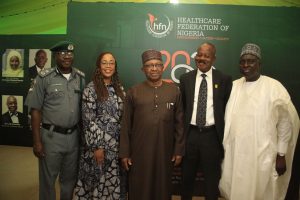Experts champion public-private partnership as key to addressing Nigeria’s healthcare challenges
February 10, 2023656 views0 comments
By Business A.M
Nigeria’s healthcare ecosystem faces several challenges, from fiscal policy gaps/implementation deficiencies to monetary policy unpredictability, depletion of human resources across the healthcare value chain, insufficient healthcare funding, insufficient stakeholder collaboration for effective resolution of sectoral challenges, insufficiencies in healthcare sector education, healthcare sector remuneration for industry professionals, among others.
To resolve these challenges, experts say there is a need for effective collaboration between the private and public sectors.
The experts, who spoke at the Healthcare Federation of Nigeria (HFN) Annual Conference and General Meeting in Lagos, emphasised that leveraging partnership between the private and public health sectors would help to save over 200 million Nigerians and build a futuristic healthcare system.
Read Also:
Osagie Ehanire, minister of health, said though largely based on urban centres, the private healthcare sector in Nigeria is robust and growing steadily, serving 50 percent of the population.
Ehanire expressed the government’s commitment towards further engaging the private sector for inclusive and sustainable healthcare delivery for Nigerians.
He said the government would continue to support entrepreneurs/manufacturers in the sector “as much as possible with access to technology and finance because local manufacturing is a solution to certain health challenges which threaten national health security”.
“The Health Ministry is more interested in the health of Nigerians and that is why we are supporting the private sector to achieve universal health coverage,” Ehanire said at the conference themed “Building the Healthcare of Our Future”.
“The private sector comprises people who are into drugs manufacturing, equipment procurement and lots more and that is why we are to put heads together to better the health of Nigerians,” he said.
The minister said through regular engagements like the HFN Annual Conference, Nigerians would be able to enjoy inclusive and sustainable healthcare.
Aminu Waziri Tambuwal, Sokoto State governor and chairman, Nigeria Governors’ Forum, in a goodwill message reiterated the importance of partnership with the private sector.
Tambuwal assured the HFN members that “the NGF would continue to provide the necessary enabling environment for the private sector to operate optimally and for our partnership to thrive”.
Speaking earlier on the theme of the conference, Pamela Ajayi, HFN president, said the conference was organised to proffer solutions to some of the challenges in the health sector.
Ajayi called for a shift of focus away from challenges and towards finding solutions.
“This conference is set out to proffer solutions to some of these problems which cut across policy, healthcare financing and investment, health insurance, human resources crisis, and lots more,” she said.
The HFN president said the private sector had a lot to offer towards building a healthcare sector that everyone would be proud of, adding, “We are ready to work with whichever government that comes in after the election to advance health in the country.”
Tosin Runsewe, founder, AfyACare Nigeria Limited, called for collaborative efforts to scale up the number of Nigerians under the National Health Insurance Scheme (NHIS) for easy access to healthcare delivery.

Runsewe, who spoke as a panellist at one of the conference sessions on “Healthcare Investment and Financing”, commended the signing of the National Health Insurance Authority (NHIA) Bill 2022.
“Today, we have just about 5 percent of Nigeria’s population covered in every health insurance, what do we do to get this figure up to 50 percent or more is the most important question we should all ask ourselves,” Runsewe said.
He said the more people were able to afford healthcare, the better the quality and standard that people would receive.
“The government has made a huge step forward with the signing of the NHIA Act and deserves accolades, but that is just the first step.We need to implement it in a way that will ensure majority of Nigerians are covered and have the right insurance policy that will enable them to walk into any hospital to access good care,” he said.
Runsewe further called for an increase in the training capacity in the country in order to increase the number of medical students graduating annually to meet the healthcare demand.
The Annual Conference of HFN, a coalition of Nigerian private healthcare sector stakeholders, featured panel sessions on various topics including “Healthcare Investment and Financing”, “Pharmaceutical Sector Issues: From Local Manufacturing, Research and Development, to Drug-Revolving Schemes”, “Implementing the New NHIA: Implications of HMOs, Providers and Employers”, and “The Diaspora Dialogue: Addressing the Human Resource Crisis Structures, Systems and Technology”, with speakers and panellists proffering ways to resolve perennial issues holding the sector down.
